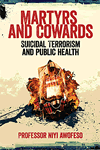eBook
Political Science
As the macabre al-Qaeda attacks of 11 September 2001 on the United States illustrate, suicidal terrorism constitutes an enigmatic form of violence in which a fighter's certain death is a precondition for the execution of an attack. The apparent willingness of suicide bombers to die in order to execute their bombing attacks, the relative ease of adjusting tactics in order to pinpoint targets, and the modest cost of implementing such attacks underscore the serious threats that suicide bombers pose to national and global security. In Iraq, for example, 200 coalition soldiers and 12,284 Iraqi civilians were killed from 2003 to 2010. In the same period 30,644 Iraqi civilians and 8023 coalition soldiers were injured.
Deaths and injuries are not the only consequences of suicidal terrorism. Loss of security and wellbeing, psychological illness as well as loss of social cohesion affect a far greater proportion of the population and significantly impede health advancement and socio-economic development.
Using social explanation and synthetic analysis techniques, this book explores the multifaceted links between suicidal terrorism and public health, discusses a framework for understanding motivations of suicidal terrorists and highlights the public health consequences of suicidal terrorism. It also proposes interventions to reduce the occurrence of suicidal terrorism and enhance multidisciplinary response to this global threat.

